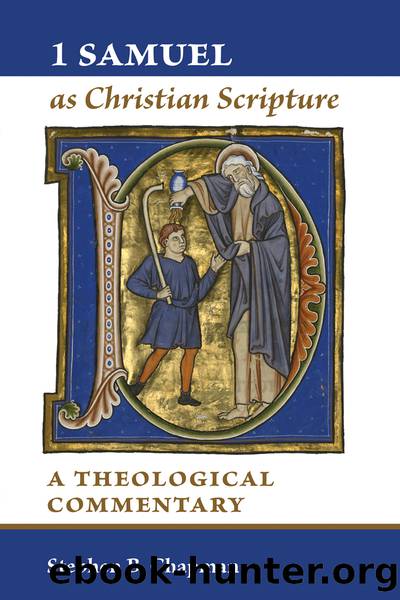1 Samuel as Christian Scripture by Chapman Stephen B.;

Author:Chapman, Stephen B.;
Language: eng
Format: epub
Publisher: Wm. B. Eerdmans Publishing Co.
Published: 2016-04-14T12:33:55+00:00
Saul in Pursuit (1 Samuel 23)
The beginning of this chapter reiterates and further emphasizes the developing narrative portrait of David as a spiritual leader who habitually consults the will of God.23 In response to a Philistine attack on the Israelite town of Keilah, David is again shown to engage in divination. He twice âasksâ (âšʾl) God for counsel on the best course of action and God twice directs David into battle against the Philistines (23:2, 4). Whether or not David employs a divinatory intermediary is unclear. No intermediary is named or described, but then sometimes such accounts are written as if no intermediary is present even when it is apparent from the context that one is (e.g., 1 Sam 14:36-37). This kind of narrative presentation is possible because the intermediary is conceived as being merely instrumental to the humanâdivine conversation and not himself a partner in the discussion. Moreover, the binary phrasing of Davidâs initial question implies that once more the sacred lots are likely being used as the actual means of divination â and the narrative has already established the precedent that a priest performs the rite of the lots (e.g., 1 Sam 14:19).24
On the other hand, many of Israelâs priests have just been killed (22:18) and are therefore no longer available for ritual assistance. So perhaps David is here suggested to engage in divination as his own intermediary. The narrative has not placed any explicit limits on the possibility of a king engaging in or directing religious rites personally. At the same time, one would expect some sort of limitation to be in place, if only because of the existence of an official priesthood. Also, in the narrative world of this text there does exist an awareness that religious objects and actions must be handled with care, and can be dangerous to those who exceed such limitations (e.g., 1 Sam 6:19-20; 2 Sam 6:6-7).
What matters most for the purpose of this study is not what âreallyâ happened, but how Davidâs divination is being depicted. Whether or not it is conventional, the narration of the divinatory exchange between David and God suggests a degree of personal interaction between the two of them that is all the more striking for being absent with Saul. Not only are Saulâs efforts at ritual participation routinely interrupted or bungled, he is almost always portrayed as relying upon the spiritual ability of others rather than interacting with God directly. In comparison, David not only appears to speak to God directly but to receive Godâs replies personally. The successful outcome of his campaign against the Philistines in Keilah confirms Davidâs prophet-like ability to gain insight into Godâs intentions and plans (23:5). The likelihood that David is depicted as performing the act of divination himself is increased further by the narrativeâs subsequent report that Abiathar fled to David at Keilah with a priestly ephod (23:6). In other words, only after David had already successfully divined the will of God on his own was he joined by the priest who would have otherwise customarily performed that rite.
Download
This site does not store any files on its server. We only index and link to content provided by other sites. Please contact the content providers to delete copyright contents if any and email us, we'll remove relevant links or contents immediately.
The Five People You Meet in Heaven by Mitch Albom(2853)
Name Book, The: Over 10,000 Names--Their Meanings, Origins, and Spiritual Significance by Astoria Dorothy(2500)
Real Sex by Lauren F. Winner(2487)
The Holy Spirit by Billy Graham(2433)
The Secret Power of Speaking God's Word by Joyce Meyer(2264)
0041152001443424520 .pdf by Unknown(2230)
How The Mind Works by Steven Pinker(2228)
ESV Study Bible by Crossway(2146)
Ancient Worlds by Michael Scott(2113)
The Meaning of the Library by unknow(2078)
The Gnostic Gospels by Pagels Elaine(2039)
Churchill by Paul Johnson(2019)
MOSES THE EGYPTIAN by Jan Assmann(1981)
The ESV Study Bible by Crossway Bibles(1964)
Jesus by Paul Johnson(1895)
Ancient Near Eastern Thought and the Old Testament by John H. Walton(1857)
The Nativity by Geza Vermes(1855)
The Complete Dead Sea Scrolls in English (7th Edition) (Penguin Classics) by Geza Vermes(1852)
City of Stairs by Robert Jackson Bennett(1842)
